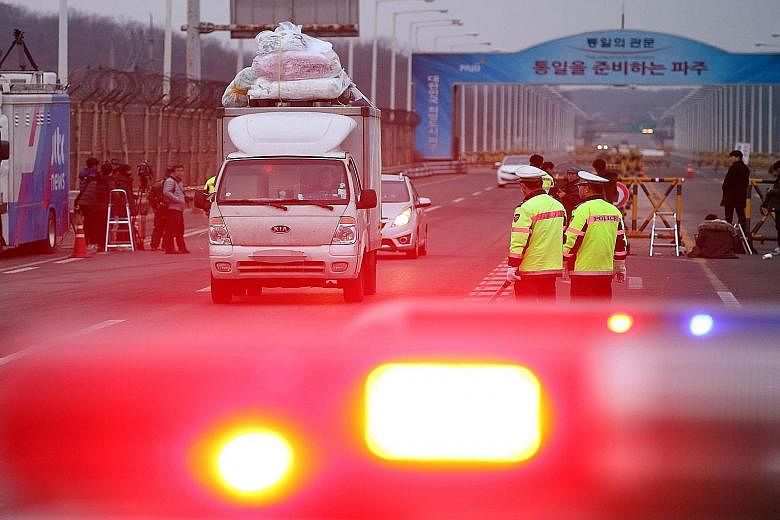PAJU (South Korea) • The United States and its Asian allies tightened the economic screws on North Korea yesterday, with the US Senate adopting fresh sanctions and South Korean firms abandoning a joint industrial park that is a key source of hard currency for the North.
The unilateral moves, including Japanese sanctions, came as United Nations Security Council members were still stalled on how far to go in punishing North Korea for its latest nuclear test and last weekend's long-range rocket launch.
Hundreds of South Korean trucks crossed the border yesterday to retrieve finished goods and equipment from the factories in the Kaesong industrial zone in North Korea. More than 120 South Korean firms employed 55,000 North Koreans at the park.
Seoul said North Korea had been using the hundreds of millions of dollars in hard currency earned from Kaesong to fund its nuclear weapon and ballistic missile programmes. North Korea called the abrupt decision to suspend operations a "declaration of war".
The move was slammed as "utterly incomprehensible" by South Korean firms operating factories in the estate, saying their businesses were being destroyed by politics.
The US Senate voted unanimously to adopt a Bill expanding sanctions. The measure, which must be reconciled with a similar House version passed last month, would punish any person or entity importing goods, technology or training related to weapons of mass destruction, or engaging in human rights abuses.
Penalties would include the seizure of assets, visa bans and denial of government contracts.
The measure is also aimed at cutting down on money laundering and narcotics trafficking - two activities believed to be funnelling millions of dollars into North Korean leader Kim Jong Un's inner circle.
"This dictatorial regime must learn that its actions have consequences," said US House Speaker Paul Ryan.
Japan on Wednesday also unveiled measures, including prohibiting North Korean ships from entering Japanese ports and an entry ban on North Korean nationals.
China, North Korea's main diplomatic protector, has been resisting the US-led push for tougher UN sanctions, despite being alarmed by its neighbour's brazen nuclear and missile tests.
The North's actions, though, have pushed South Korea and its allies to step up defences. Top military officers from the US, South Korea and Japan said they agreed at a meeting on Wednesday to step up information sharing and coordination of security efforts because of the increased threat from North Korea.
South Korea also announced plans to start formal talks on deploying an advanced missile defence system in the South. That drew rebukes from Russia and China over fears that the Terminal High Altitude Area Defence system could target their weapons.
South Korean and US forces also plan to hold their largest joint annual war games from early next month, mobilising a nuclear-powered US aircraft carrier.
AGENCE FRANCE-PRESSE, REUTERS, XINHUA

